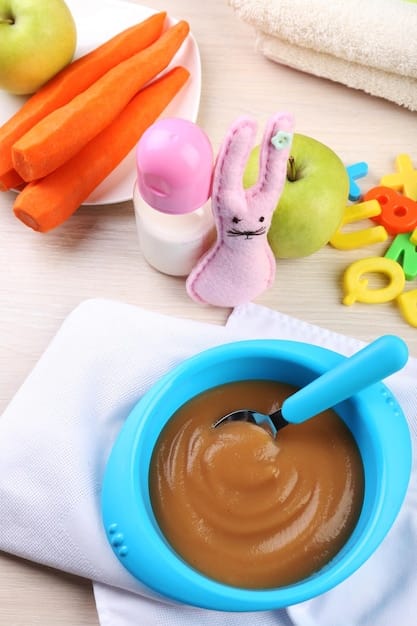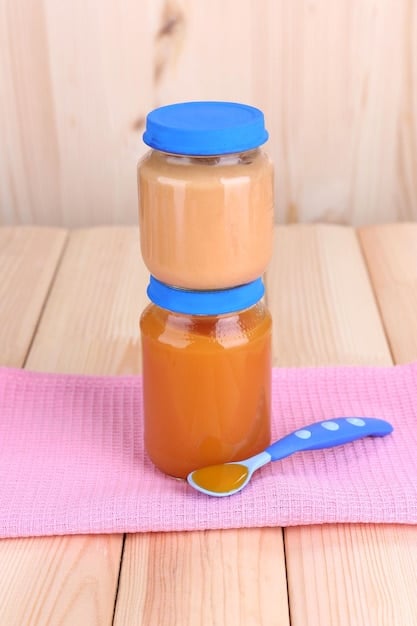Iron-Rich Foods for Babies: Top 5 to Prevent Deficiency

Iron-rich foods are essential for babies to prevent iron deficiency, which can impact their growth and development; these top five choices offer a variety of nutrients to support a healthy start.
Introducing solid foods to your baby is an exciting milestone, but ensuring they get enough iron can be a concern. Iron-rich foods for babies are crucial for preventing deficiency and supporting healthy development. Let’s explore the top five iron-rich foods you can incorporate into your baby’s diet.
Understanding the Importance of Iron for Babies
Iron plays a vital role in your baby’s growth. It’s essential for carrying oxygen throughout their body and supports brain development. It’s important to start iron-rich foods for babies early in their development process.
Why is Iron So Important?
Iron is a key component of hemoglobin, a protein in red blood cells that carries oxygen from the lungs to the rest of the body. Babies need iron for:
- Brain development: Iron supports cognitive function and overall brain health.
- Energy production: It helps convert food into energy, keeping your baby active.
- Immune system function: Iron is crucial for a strong immune system.
Iron deficiency can lead to anemia, which can cause fatigue, developmental delays, and weakened immunity. Therefore, choosing the right iron-rich foods for babies is essential to their health.
Ensuring adequate iron intake during infancy can have long-lasting effects. It’s more than just preventing immediate health issues, it is about setting up your child for a lifetime of cognitive and physical well-being.
Top 5 Iron-Rich Foods for Babies
Now that you know why iron is so important, let’s dive into the top five iron-rich foods perfect for your little one. These iron-rich foods for babies are easy to prepare and packed with nutrients.

1. Pureed Meat
Pureed meat is an excellent source of heme iron, which is easily absorbed by the body. Heme iron is only found in animal sources, making it more bioavailable compared to non-heme iron from plant-based foods. Including pureed meat as one of the iron-rich foods for babies ensures your little one gets a good start.
- Choose lean meats like beef, chicken, or turkey.
- Ensure the meat is thoroughly cooked and pureed to a smooth consistency.
- Start with small portions and gradually increase as your baby gets used to it.
2. Iron-Fortified Cereal
Iron-fortified cereal is often recommended as one of the first foods for babies. It’s readily available and designed to provide a significant amount of iron. This makes it a convenient choice among the iron-rich foods for babies.
- Look for cereals specifically labeled as “iron-fortified.”
- Mix the cereal with breast milk or formula to create a smooth, easy-to-swallow consistency.
- Follow the package instructions for proper serving sizes.
Incorporating iron-fortified cereal is a practical way to supplement your baby’s diet. It is important to offer a variety of other iron-rich foods as they grow to ensure a balanced nutritional intake.
Other Great Iron-Rich Food Options
While meat and fortified cereals are excellent choices, variety is key to a balanced diet. Here are some additional iron-rich foods for babies that contribute to their overall nutrition.
3. Lentils
Lentils are a fantastic plant-based source of iron, offering both fiber and protein alongside this essential mineral. They are versatile, easy to cook, and can be pureed to a smooth consistency for babies just starting on solids. Including lentils broadens the variety of iron-rich foods for babies, ensuring they receive a diverse range of nutrients.
- Choose brown or green lentils, as they are easier to digest and readily available.
- Cook the lentils until they are very soft.
- Puree the cooked lentils with water, breast milk, or vegetable broth to achieve the desired consistency.
4. Spinach
Spinach, a leafy green, is an excellent addition to your baby’s diet once they’re ready for more complex flavors and textures. Offering spinach can gradually introduce your baby to a wider range of vegetables and flavors. It also expands the iron-rich foods for babies they are exposed to.
- Steam or boil spinach until it’s tender.
- Puree the cooked spinach finely, ensuring there are no large pieces.
- Combine spinach with other vegetables or fruits to make it more palatable. Sweet potato or apple can be excellent complements.
5. Prune Puree
Providing prune puree introduces a natural sweetness that many babies enjoy. It’s a good option if they are resistant to other, more savory options.
- Choose prunes without pits or additives.
- Soak the prunes in warm water to soften them.
- Puree the softened prunes until smooth, adding a little water to achieve the right consistency.
Incorporate prune puree in moderation due to its natural laxative effects. A small amount can be beneficial, but excessive consumption can lead to diarrhea. It is crucial for parents to monitor how their baby responds to prune puree to ensure optimal digestive health.

Tips for Maximizing Iron Absorption
Even with the right foods, certain factors can affect how well your baby absorbs iron. Here are some tips to help maximize iron absorption from iron-rich foods for babies.
Combine Iron-Rich Foods with Vitamin C
Vitamin C enhances the absorption of non-heme iron, which is found in plant-based sources like lentils and spinach. Pairing these foods with a source of Vitamin C can significantly improve iron uptake. When serving iron-rich foods for babies, consider these combinations:
- Lentils with tomato: Add a tomato-based sauce or a small amount of tomato puree to lentils.
- Spinach with citrus: Mix spinach puree with a bit of orange juice or include a small amount of pureed orange.
Avoid Giving Iron-Rich Foods with Cow’s Milk
Cow’s milk can inhibit iron absorption due to its high calcium content. Thus, combining cow’s milk with iron-rich food can decrease iron levels. If using formula make sure to use an iron-fortified formula.
You can include the following examples:
- Avoid giving cow’s milk at the same time as iron-rich foods.
- Use breast milk or iron-fortified formula instead.
- Offer dairy products between meals rather than with iron-rich foods.
Prepare Foods Carefully
The way you prepare your baby’s food can affect its iron content. Here’s how to ensure you’re preserving as much iron as possible from iron-rich foods for babies:
- Use proper cooking techniques: Steam or lightly boil vegetables to minimize nutrient loss. Overcooking can reduce the iron content.
- Avoid adding unnecessary ingredients: Keep baby food simple and free from additives that could interfere with iron absorption.
By following these simple guidelines, you can make sure your little one absorbs as much iron as possible. Proper preparation is key to maximizing the nutritional value of their meals.
Addressing Common Concerns About Iron in Baby Food
Many parents have questions and concerns about ensuring their baby gets enough iron. Let’s address some common issues related to introducing iron-rich foods for babies.
What if My Baby Refuses Iron-Rich Foods?
It’s common for babies to be picky eaters, especially when starting solids. If your baby refuses certain iron-rich foods, don’t give up. Offering new foods multiple times in different forms can help. If you’re worried, it is important to consult your pediatrician regarding your iron-rich foods for babies choice to help you make the right desitions.
- Mix it up: Combine iron-rich foods with flavors your baby already loves. For example, mix pureed meat with sweet potato or applesauce.
- Be patient: It can take several tries for a baby to accept a new food. Continue offering it without pressure.
- Try different textures: Some babies prefer smoother purees, while others prefer slightly chunkier textures.
How Much Iron Does My Baby Need?
The recommended daily iron intake for babies varies by age.
- 7-12 months: Babies in this age group need approximately 11 mg of iron per day.
- 1-3 years: Toddlers need about 7 mg of iron per day.
Always consult with your pediatrician to determine the specific iron needs of your baby, especially if you have concerns about iron deficiency. These amounts help guide the selection of iron-rich foods for babies.
Being informed about your baby’s iron needs allows you to make more confident dietary choices. Regular check-ups with a healthcare provider remain essential to ensure proper nutrition and development during these crucial early years.
| Key Point | Brief Description |
|---|---|
| 🥩 Heme Iron | Easily absorbed from pureed meat. |
| 🥣 Fortified Cereal | Good source, mix with breast milk. |
| 🌱 Lentils & Spinach | Plant-based, pair with Vitamin C. |
| 🍑 Prune Puree | Aids digestion, use in moderation. |
FAQ
▼
Iron is essential for brain development, energy production, and immune system function. It helps carry oxygen throughout the body, supporting growth and preventing anemia.
▼
Signs of iron deficiency include fatigue, pale skin, slow growth, and developmental delays. Your pediatrician can perform a blood test to check your baby’s iron levels.
▼
Iron supplements should only be given under the guidance of a pediatrician. They can recommend the appropriate dosage and monitor your baby’s iron levels.
▼
Try mixing iron-rich foods with flavors your baby enjoys, such as sweet potato or applesauce. Offer the food multiple times and be patient, as it can take time for babies to accept new tastes.
▼
Yes, vegetarian babies can get enough iron from plant-based sources like lentils, spinach, and fortified cereals. Combining these foods with vitamin C can enhance iron absorption. Consult your pediatrician for guidance.
Conclusion
Ensuring your baby gets enough iron is essential for their healthy development. Incorporating these top five iron-rich foods for babies – pureed meat, iron-fortified cereal, lentils, spinach, and prune puree – can help prevent iron deficiency and support your little one’s growth. Remember to consult with your pediatrician for personalized advice and to address any concerns about your baby’s iron intake.





